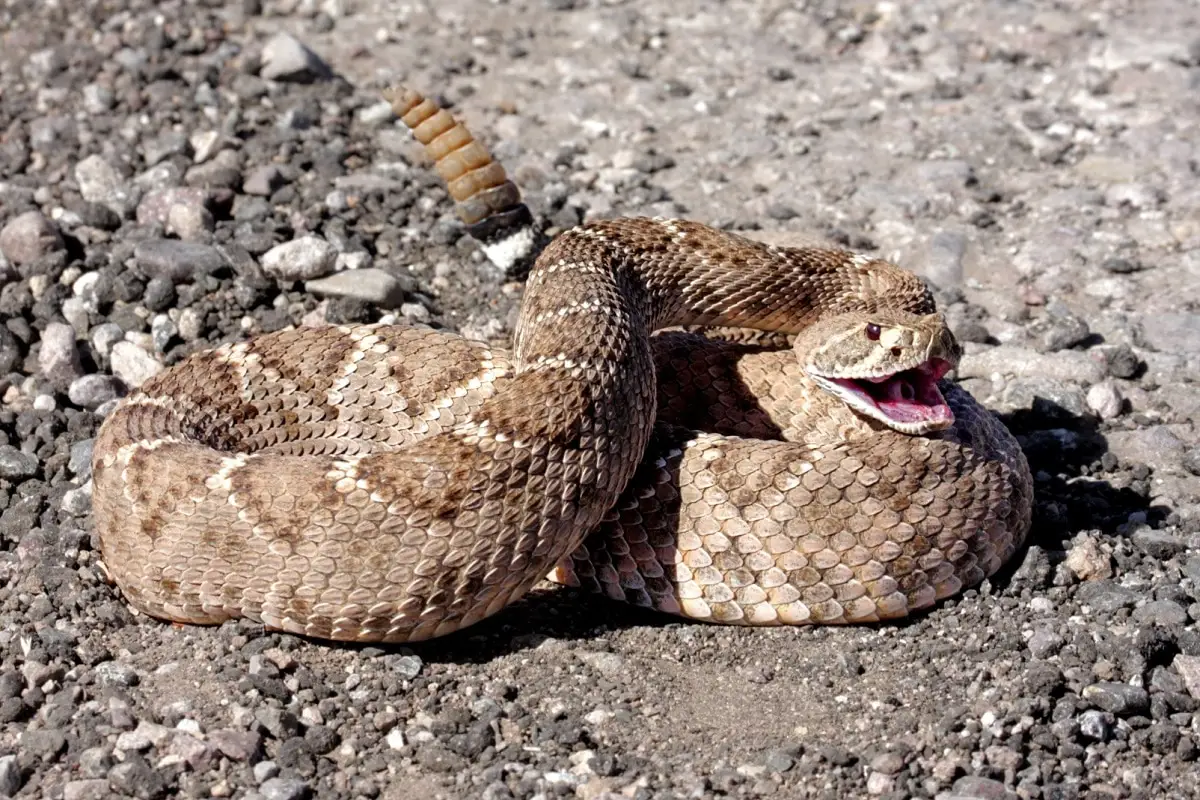Rattlesnakes, also known as pit vipers, are common throughout the Americas. When faced with threats, rattlesnakes will hide, if they can. If not, they will hiss and rattle their tail to try and scare possible predators away.
Most rattlesnake bites to humans happen when they unintentionally step on one or get too close while hiking or walking in nature. Rattlesnakes are good at hiding and have skin patterns that make them hard to spot against rocks and grasses. However, even professional snake handlers who know how to safely interact with rattlesnakes are sometimes bitten.
If a rattlesnake bites a human, they can sink their fangs and pump dangerous amounts of venom into the flesh, which will cause some significant health consequences. Fortunately, most rattlesnake bites do not end in the death of the victim. According to the National Center For Biotechnology Information (NCBI), only five deaths occur for approximately 9,000 people bitten per year in the United States.
What Happens When a Rattlesnake Bites You?
A rattlesnake will often rattle prior to striking a predator, which is usually in self-defense. If a rattlesnake bites you, the venom will only need seconds to travel through the fangs and into your skin and bloodstream. You will not have to wait long to feel pain and feel the symptoms of the venom, perhaps only seconds or minutes. The reason these symptoms occur is generally that the venom has injected deep into the tissue under the skin, possibly causing internal damage to vital organs.

Damage Caused by Rattlesnake Venom
Physical Damage
Potential physical damage from rattlesnake bites on humans:
- Amputation of the bitten limb (severe cases)
- Death (worst case scenario)
- Necrosis (death of tissue at the location of the bite)
- Fang bite scars
- Bleeding, swelling, and redness at the bite site.
- Intense physical pain (short to medium term)
- Nausea, vomiting, diarrhea, dizziness, tiredness.
A snake bite will likely get worse over several days following the bite. The area could swell and change color to red or black, along with being very painful. The person could feel sick or nauseous as well. It is important to get to a medical facility as quickly as possible following a snakebite from any type of snake. The longer venom stays in your system without treatment means the side effects will be worse.
Fortunately, most rattlesnake bites do not become infected when left without treatment because the venom actually helps kill bacteria, but this can happen. If the bite victim also tries to run away from the rattlesnake after they are bitten, they could possibly have cuts, embedded slivers of wood, or sustain broken bones.
Useful Rattlesnake Rellents
Ortho Snake B Gon1 – Snake Repellent Granules, No-Stink Formula, Covers Up to 1,440 sq. ft., 2 lbs.
Harris Snake Repellent Spray for Indoor and Outdoor Use, 20oz
Victor VP363 Way Snake Repelling Granules – 1.75 LB
Psychological Damage
In severe rattlesnake envenomations, altered mental states may occur. This is more likely to happen as time progresses without medical intervention. In a regular or mild rattlesnake bite, intense pain could cause emotional distress, worry, and fear. If it leads to panic, your heart could start racing and your adrenaline could start pumping. A bad snakebite could make you wary of hiking out alone or without adequate boots and leg protection long after the event. Fear of going hiking or getting exercise in parks and other natural spaces might lead you to stop working out altogether. Perhaps getting a gym membership will help keep you in shape until you feel better about going out into the wild again.
How Long Does It Take to Recover From a Rattlesnake Bite?
Recovery from a rattlesnake bite depends on the speed of treatment with antivenom, the amount of venom that was injected via the bite, and the overall health and age of the victim. Most people who are bit by rattlesnakes have intense pain for at least a short period of time. Time away from work or vacation will probably be required until the person makes a full recovery and symptoms disappear. Make sure to follow the guidance of your health care provider if you are ever bitten by a rattlesnake and need treatment.
What Are The Long Term Effects Of A Rattlesnake Bite?
Rattlesnake bites can have long-term impacts on the lives of the victims, extending into several years after the event. One study put the percent of affected victims that had lingering negative symptoms of a rattlesnake bite at between 30% and 70%. These symptoms varied in terms of intensity and severity, but most did not result in significant disability.
Long term affects of rattlesnake bites include:
- Kidney failure
- Fang bite scars
- Psychological scars
- Pain-related to fatigue
- Physical weakness
- Possible motor deficits
- Severe shock that could lead to a stroke.
Antivenom can also have negative long-term effects on the internal organs, such as distorted or damaged kidney function. The benefits of administering antivenom to a rattlesnake victim might not outweigh the risks, so each case must be judged by the medical provider. It’s also important to consider that the long-term effects of envenomation of humans by specific species of rattlesnakes have not been fully studied yet.
The degree of rattlesnake envenomation matters, as does the overall health and age of the individual that is bitten. In most cases, the bitten person will recover fully without any long-term complications. In rare cases, people can take months to fully recover, and in the case of a stroke, not recover fully at all.
So, when you come across a rattlesnake, it is best to avoid it and do not attempt to pick it up or handle it in any way. Leave these little critters alone in their natural habitat and just carry on the path ahead of you.
